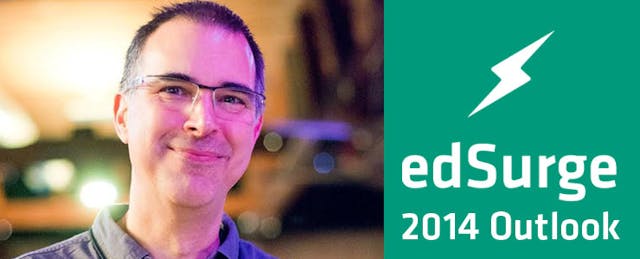I’m entering into 2014 not with a prediction, but with a hope--that in the new year, the education technology hype-hysteria pendulum will swing less extremely and less frequently.
This year should have delighted me. When I started working in education nearly two decades ago, edtech was a challenging backwater that most educators and consumer technologists didn’t take seriously. The Oregon Trail and Apple IIe were the height of sophistication. Brand-new multimedia CD-ROM programs had the potential to replace LaserDiscs in the classroom. If I mentioned to tech industry colleagues that I worked in education technology, I’d do so thinking “software, digital content and the Internet,” while they would be hearing “projectors.”
Finally, 2013 became the year that edtech went mainstream. But my celebration is tinged with frustration due to bad actors at the extremes, some who seem driven by agendas that have little to do with improving learning.
The Cheerleaders
At one extreme are the cheerleaders. Most often, these are geeky entrepreneurs with a technology-solves-all mindset that use the word “disrupt” the way others use “uh.” They see education as an engineering problem that can be fixed by technology, and think developing good learning applications is as easy as plastering a Facebook-like interface and game levels on the same drill-and-kill software. A few even repeat variations of the tired dot-com era slogan, “They’ll have so much fun, they won’t even know they’re learning!”
The worst cheerleaders are ignorant to the point of arrogance about real classroom environments, confusing cluelessness with the truly desirable state of not setting preconceived limits. And their motivation, in many cases, may be summed up by an awful headline that appeared over one entrepreneur-focused blog post, “Social Entrepreneurs in Education: MIT’s Tips to Cash-In.”
The Paranoids
At another extreme are the paranoids. Not the thoughtfully skeptical, because there are a lot of important concerns about the appropriate use of technology in teaching and learning that demand direct, sober questioning.
No, I mean the loons and conspiracy theorists who see any increased use of technology in schools as a sign that the black helicopters are next. Their desire appears less about carefully applying appropriate technology and more about preventing any of it. I’ve seen these no-shades-of-gray arguments in acrimonious debates on several edtech subjects. Most prominent are arguments on student data storage in New York, as many apparently forget that student information has been digitally gathered and stored for years (security, privacy and functionality do remain vitally important).
In this case, the driver isn’t greed or we-nerds-know-better haughtiness. It seems more about emotion trumping facts, fueled with guilt by association and unrealized fears of what might happen (“What? You invented the wheel? You could get crushed under that!”).
The Dogmatists
At a third extreme is a certain contingent of education “reformers” who either blindly promote or oppose edtech to further a political, pedagogic or book-selling agenda. In this case, the fact that it is “technology”--whether it’s online education or digitally delivered tests--is simply the latest hook on which to hang their dogmatic hat.
Sure, these are the extremes. There are also reasonable, informed, and well-meaning tech entrepreneurs, opponents and reformers. But their voices are easily covered by the cacophony.
What’s missing in all three groups? The realization that:
a) We’ve had technology in education for years,
b) There is no one-size-fits-all, magic application for students, educators or parents, and
c) You can’t blithely impose or remove digital devices, tools and content without taking into account the complexities of real-world education.
This isn’t multiple choice. It’s all of the above.
Dissent is healthy for furthering informed discussion about education technology’s role in supporting the entire education community, whether it’s in school, at home or in the workplace. But high-handedness, dismissiveness and personal attacks don’t get anyone anything but headlines and heartburn.
So my hope is that 2014 aspires to be better than 2013. Not in how rapidly or completely we adopt what’s now mainstream education technology. But that, in how we choose to disagree and discuss edtech’s role, we will make a kindergarten teacher proud.
Frank Catalano is an independent industry strategist, author and veteran analyst of digital education and consumer technologies. He's a regular columnist for the tech news site GeekWire and tweets @FrankCatalano. His is aware that generalizations are always wrong.


